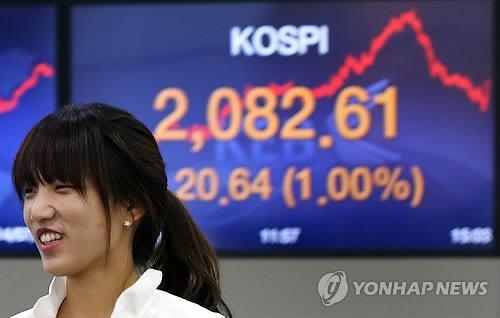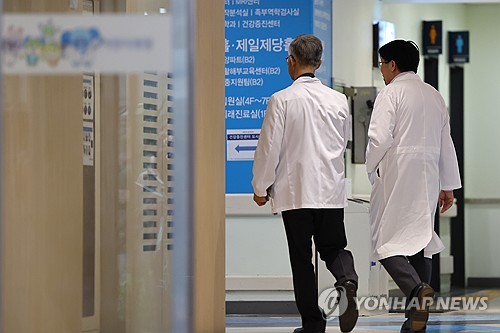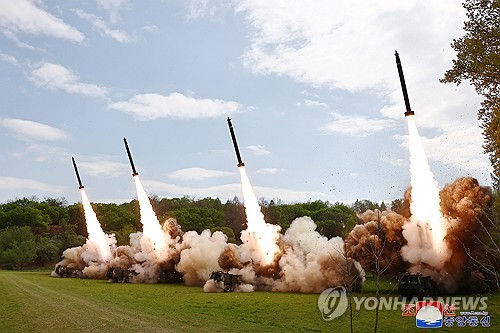(LEAD) (News Focus) Hopes for bigger dividend boosts market, but market watchers have questions
(ATTN: REVISES ratio explanation in fourth para)
By Kim Eun-jung
SEOUL, Aug. 1 (Yonhap) -- The government's new push to funnel corporate money to households through bigger dividends proved a quick remedy for the dull local bourse, but market watchers largely remain doubtful of its goal of boosting domestic consumption.
As soon as he took office on July 16, Finance Minister Choi Kyung-hwan said big companies were sitting on too much cash and pressed them to increase investments and dividend payments to create jobs and raise household income.
As follow-up measures, the finance ministry on Tuesday unveiled a spate of proposals to levy taxes on firms that do not spend enough of their cash on dividends.
The dividend yield ratio of South Korea's top 10 business groups averaged 0.8 percent last year, delivering even less than interest on bank deposits, according to Chaebul.com, which tracks the country's conglomerates. The financial ratio shows how much a company pays out in dividends each year relative to its share price.
Separate data from bourse operator Korea Exchange said the country's dividend payout ratio was 22.4 percent, far behind the 47.7 percent average in other countries.
Such low figures are partly blamed for Korean shares being undervalued compared to their global peers.
The prospect of better dividends lured investors to the equities market. Driven by a strong foreign buying spree, the benchmark KOSPI, kept on a short leash for months between 1,990 and 2,010 points, shot up to over 2,080 points on Wednesday.
Although new economic management proposals need parliamentary approval, which could take months before full implementation, market watchers expect the recent surge will last for a while, aided by signs of economic recovery in the United States and China.
But as to whether the dividends will reach the targeted group is another matter, market watchers say.
In South Korea, where the equity market relies heavily on offshore funds, foreigners and institutions are likely to benefit the most from higher dividends from big firms.
According to the finance ministry, foreigners owned 32.9 percent of KOSPI 200 company shares as of the end of last year, followed by conglomerates with 24.1 percent and institutions with 16.1 percent. Individual investors had 23.6 percent.
About 33,000 people with an annual income of over 100 million won received 7.1 trillion won, or 95 percent, of dividends paid to individuals last year, data by National Tax Services showed. In a country with a population of 51 million, the figure attests that only a handful of high earners in Asia's fourth-largest economy call stocks their major asset.
When it comes to the top 20 companies, the portion of foreign investors is even larger at 43.9 percent of the total, receiving nearly half of the 6.2 trillion won worth of dividends paid by them last year.
Chang Ha-joon, an economics professor at Cambridge University, was skeptical that the dividend policy would have the desired result of uplifting the national economy and improving the livelihoods of ordinary people.
"I am not sure about the increased dividends' effect on boosting consumption because the money will flood into pockets of foreign and institutional investors, unlike its original purpose of circulating money," Chang told reporters during his book launching event held in Seoul on July 28. "Whether manufacturers sit on cash or rich people get more dividends, it would make no difference."
Analysts say the government's effort to change the dividend policy will bring in more funds to the equity market in the current low-interest environment, but they also say there has to be consideration of various factors, including sectors, business cycle and free cash flow.
Park Sung-hyun, a strategist at Hanwha Investment & Securities Co., cautioned against jumping to the conclusion that "dividend is good, cash reserve is bad."
"It is important to look into companies' free cash flow to see whether they are really capable of increasing dividends," Park said. "Re-rating of Korea Inc. through the dividend policy will be possible only after companies pay dividends reasonable to their business cycle."
Park recommended that investors pay more attention to growing companies that make enough investment, and mature companies that pay reasonable dividends, calling for more incentives rather than regulations to encourage firms to give back more to investors.
The nation's conglomerates, run by families through complex cyclical shareholding, are cautiously monitoring the latest development, holding off on their response.
Samsung Electronics, the nation's No. 1 company by market value, released a weaker-than-expected second-quarter earnings report on Thursday due to its slackening mobile business. It said it will pay the same interim dividend of 500 won to shareholders, arguing that long-term investment for a business turnaround takes priority. The company's shares tumbled 3.73 percent on the day as disappointed investors unloaded them.
Market watchers say that the government should make fundamental efforts to create a more business-friendly environment. The economy management plan, which focuses on an expansionary policy through more spending, could create a bubble and raise long-term financial risk, they argue.
"The government should rather improve the labor environment and taxation system to encourage companies to invest more, which would in turn lead to more profit and employment down the road," said Yon Kang-heum, a business professor at Seoul-based Yonsei University.
The business community in general is skeptical as well.
The Federation of Korean Industries (FKI), which speaks for big conglomerates, said most of the money set aside has already been earmarked to build plants, purchase production facilities, and other investment means.
"The penalty tax on companies' cash reserve wouldn't lead to expansion of investment and wages," said Kim Yoon-kyung, a researcher at FKI-run Korea Economic Research Institute. "Even if companies increase their dividend to avoid tax on their cash reserve, its impact would fall short of expectations for increased domestic investment and consumption."
ejkim@yna.co.kr
(END)
-
 Overdue debut of Korean abstract art pioneer Yoo Young-kuk at Venice Biennale
Overdue debut of Korean abstract art pioneer Yoo Young-kuk at Venice Biennale -
 Relax, immerse yourself in scents at Venice Biennale's Korean Pavilion
Relax, immerse yourself in scents at Venice Biennale's Korean Pavilion -
 S. Korea marks 30th anniv. of Korean Pavilion at Venice Biennale with contemporary art
S. Korea marks 30th anniv. of Korean Pavilion at Venice Biennale with contemporary art -
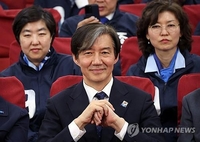 Ex-Justice Minister Cho slams Yoon's statement on crushing election defeat
Ex-Justice Minister Cho slams Yoon's statement on crushing election defeat -
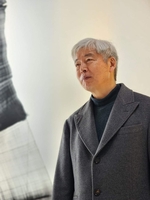 Artist Lee Bae captures ethereal Korean aesthetics at Venice Biennale
Artist Lee Bae captures ethereal Korean aesthetics at Venice Biennale
-
 Overdue debut of Korean abstract art pioneer Yoo Young-kuk at Venice Biennale
Overdue debut of Korean abstract art pioneer Yoo Young-kuk at Venice Biennale -
 Relax, immerse yourself in scents at Venice Biennale's Korean Pavilion
Relax, immerse yourself in scents at Venice Biennale's Korean Pavilion -
 Artist Lee Bae captures ethereal Korean aesthetics at Venice Biennale
Artist Lee Bae captures ethereal Korean aesthetics at Venice Biennale -
 S. Korea marks 30th anniv. of Korean Pavilion at Venice Biennale with contemporary art
S. Korea marks 30th anniv. of Korean Pavilion at Venice Biennale with contemporary art -
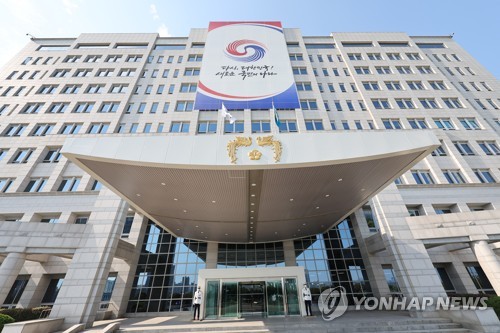 (LEAD) Presidential office denies Moon aides under consideration for PM, chief of staff
(LEAD) Presidential office denies Moon aides under consideration for PM, chief of staff
-
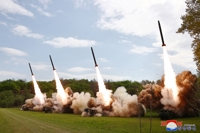 (LEAD) N. Korea says Kim guided simulated nuclear counterattack drill
(LEAD) N. Korea says Kim guided simulated nuclear counterattack drill -
 Hybe says spinoff attempt by subsidiary label revealed clearly
Hybe says spinoff attempt by subsidiary label revealed clearly -
 Hybe launches audit into NewJeans' label ADOR over alleged independence move
Hybe launches audit into NewJeans' label ADOR over alleged independence move -
 N. Korea says Kim guided simulated nuclear counterattack drills for 1st time
N. Korea says Kim guided simulated nuclear counterattack drills for 1st time -
 (LEAD) N. Korea fires several short-range ballistic missiles toward East Sea: JCS
(LEAD) N. Korea fires several short-range ballistic missiles toward East Sea: JCS
